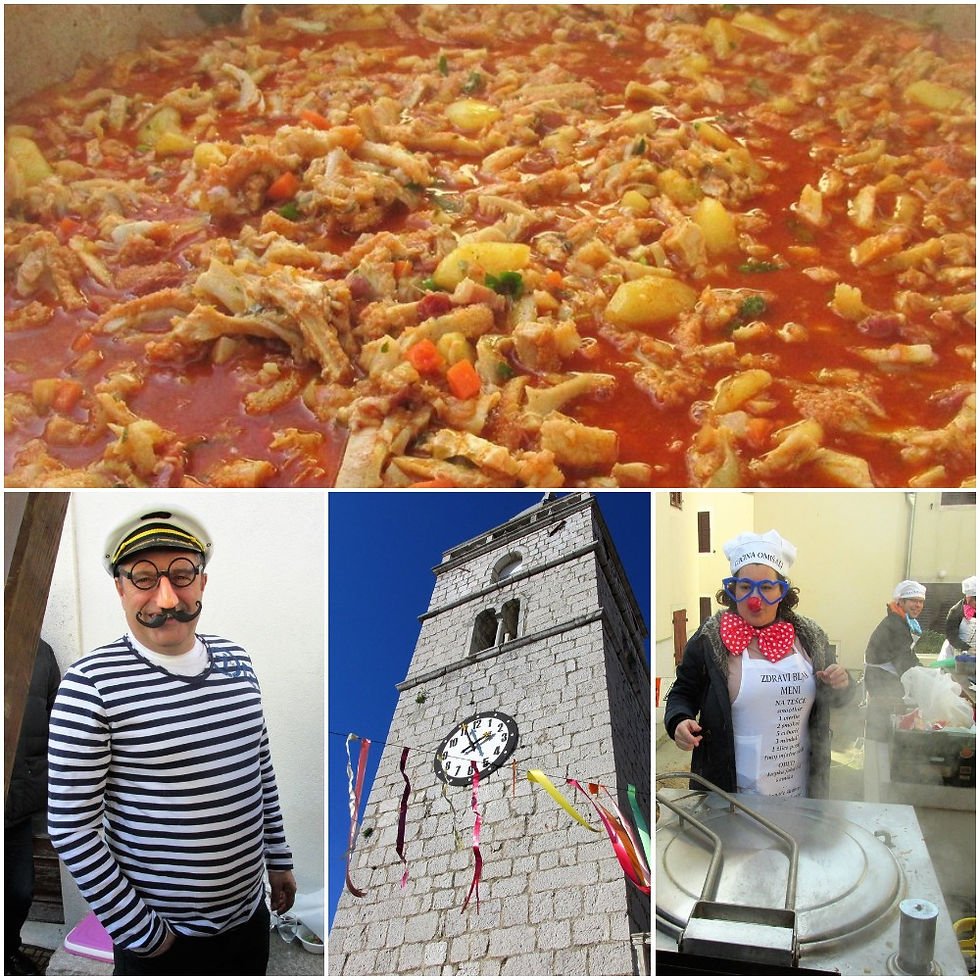Bljak Fest Omišalj 2019: From pig's eyes to the bull's balls
- Vedran Obućina

- Feb 16, 2019
- 4 min read
Updated: Oct 25, 2021

In former resorts on the entire Adriatic coast, the menu once a week included tripe for lunch. I remember that only a few guests stayed for lunch in the dining room, as they were the only ones happy with the offer of dishes made of cleansed guts of cattle or lamb. Today, tripe has become the required dish, like many other recipes of workers and laborers. The preparation is usually based on cooked pieces of cleansed stomach together with other foods in the water (onions, pancetta) until a thick soup or goulash is obtained. Beef and veal tripe are especially popular in Croatia, but it is a great pleasure to try lamb tripe too! This dish, which marked bad moments in many early childhoods, was made by the employees of the Municipality of Omišalj, a place in the north of the island of Krk, which for the ninth year prepares the unique Bljak Fest as a festival of specific specialties of the folk gastronomic heritage of Croatia!

On the central square, at the foot of the bell tower of the Church of the Assumption of the Blessed Virgin Mary, the beautiful winter day brought together a multitude of visitors who were tasting the yuck food at the booths of carnival groups from the island of Krk. This is how the Omišalj and Njivice Tourist Association managed to connect the carnival with the low tourist season in Omišalj, said Director of TZ Andrea Orlić Čutul and expert associate Adriana Dojčinović. The idea is certainly among the most original in the whole country, and the supply and kind of food is such that it would not be ashamed of the famous gastronomy search of strange and bizarre foods by Andrew Zimmern. This is also a welcoming departure from the usual carnival food that often falls on the fritule and kroštule cakes, as if every end of the Kvarner is not having a winter recipe that can be easily made for a multitude of people.

The idea of this event was made by Damir Jakovčić, who did not think long before understanding how a carnival can be enriched with the folk culinary traditions, many of which are becoming rare or are threatened by utter oblivion. Since its inception and the beginning of the Bljakfest, two Omišalj Carnival groups have participated: Babani and Omišjanski Babani. This year they prepared classic dishes from the giblets. Omišjanski Babani offered a white kidney and a liver on the grill, pancakes and a cake of surprise (made in the form of a toilet seat). Many do not know that white kidneys are actually testicles (most commonly of bulls and boars), which is also a main feature of the Mudijada festival in neighbouring Serbia, in Ozrem. In ancient times, white kidneys were mostly prepared with eggs after animal slaughter, and today rarely some establishments offer this "treat." The Babani had the "avian flu" or chicken heart and liver with polenta, a dish that is often found on family tables throughout Croatia.

In neighbouring Njivice there is also the famous restaurant Rivica which too wanted to contribute through its culinary art to the Bljak Fest. Under the motto "in the Healthy Brain", these culinary masterchefs have been preparing the veal brain. Brains are traditionally the first to be made as a dish during an animal slaughter because the brain needs to be prepared while fresh, best with eggs. Along with the brain, Rivica delighted every guest with green vegetables in white chocolate, which was definitely not a yuck thing! Hotels Njivice made pig eyes. At first, we thought it was another imaginative name for some "delicious" part of pork meat, but it is really about the eyes, prepared in sauce. This strangely bloody meal has a distinctly jelly taste, given the multitude of eye tissue. We do not know if this recipe has been passed down by generations, but in one thing we are certain: every part of the animal has been used in the past, so we are not surprised that pig’s eyes were on the menu!

In Punat, a place known for its olives and marina, but also with a good gastronomic offer, such as the restaurant Sidro, only seldom one can find kiselica, a sour winter stew, but the Puntarske užance have done this and make this old winter dish for the Bljak Fest. Kiselica is home-grown cabbage, made sour by its own lactic acid, although sometimes home-made vinegar is also added. Additionally, this special minestrone comes with potatoes and beans. Kiselica was often a dish of Punat people in scarce winters, and today some of the households are still preparing this dish, although the gastronomic offer of Puntat is increasingly trying to include kiselica on the guest table. Krabuje Drivenik, a carnival group from Drivenik, prepared the Drivenik parody, which consisted of cured meat products, while ŠRD Zubatac prepared a blend of sea-salad, a mixture of seafood with potatoes. The Family for Youth Association has offered a selection of famous desserts: fritters and poderane gaće. This, a little less unusual food, came as an intermezzo to the weird traditions of the winter diet. The Insula group impressed guests with the Kvarner song, and the famous singer Dražen Turina Šajeta was also visiting the various stands with foods. A climatic height was prepared by the carnival group from Novi Vinodolski with his orchestra. The guests were properly welcomed with drinks in the tavern Ulikva, an old family gastronomic tradition in the centre of Omišalj, which briefly opened the doors to guests in this peaceful winter time of the year.






































































Comments